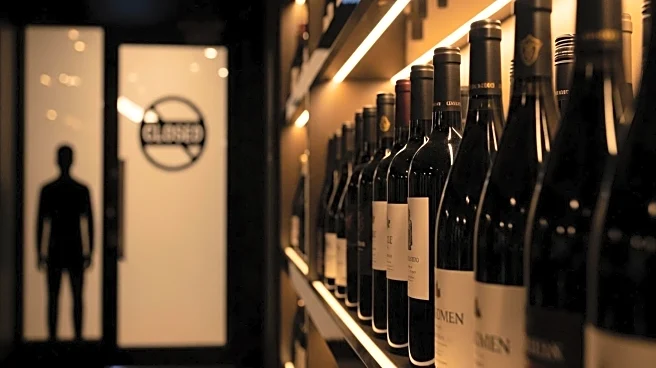What's Happening?
New York authorities are imposing restrictions on the opening of new wine and liquor stores as alcohol sales decline significantly. The State Liquor Authority (SLA) is rejecting up to 70% of license applications this year, fearing that new stores could jeopardize existing businesses. This decision comes as alcohol sales in New York have dropped by as much as 25% this year, exacerbated by new tariffs on imported liquor and wine. The decline in sales is attributed to changing consumer preferences, with more Americans viewing even moderate drinking as unhealthy. Additionally, the rise of cannabis as a preferred alternative has further impacted alcohol sales. Some liquor stores have voluntarily surrendered their licenses, and others are pivoting to selling less expensive wines to maintain sales.
Why It's Important?
The decline in alcohol sales and the subsequent restrictions on new liquor store openings have significant implications for the retail and hospitality industries in New York. Existing liquor stores face increased competition and financial strain, leading to closures and a shift in business strategies. The imposition of tariffs on European wines by the Trump administration has further complicated the situation, increasing costs for retailers. The changing consumer preferences towards healthier lifestyles and alternative substances like cannabis are reshaping the market dynamics. This trend could lead to a long-term transformation in the alcohol retail sector, affecting employment and economic activity in the industry.
What's Next?
As the SLA continues to restrict new liquor store licenses, existing retailers may need to adapt by diversifying their product offerings and focusing on more affordable options. The industry might see a consolidation as weaker players exit the market. Policymakers and industry stakeholders may need to address the broader economic and social factors contributing to the decline in alcohol consumption. The impact of tariffs on imported wines could also prompt discussions on trade policies and their effects on local businesses. The evolving consumer preferences may lead to increased investment in alternative products, such as cannabis, which could further influence market trends.
Beyond the Headlines
The decline in alcohol sales and the shift in consumer preferences highlight broader cultural and societal changes. The growing awareness of health risks associated with alcohol consumption reflects a shift towards healthier lifestyles. This trend could have long-term implications for public health policies and education. Additionally, the rise of cannabis as a popular alternative raises questions about regulatory frameworks and the need for balanced policies that address both public health and economic interests. The transformation in the alcohol retail sector may also influence cultural norms and social behaviors related to drinking.








